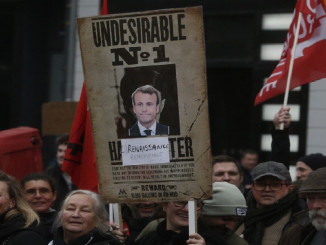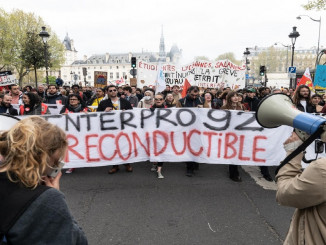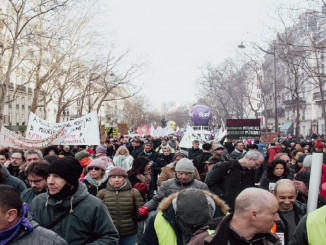Across the country, state and city governments are using the excuse of budget deficits to cut funding for whatever they think they can get away with. After continuously cutting funds for education, social services, transportation, and housing, the latest item on their chopping block is public workers’ pensions. Politicians try to blame the budget shortfalls on the big price tags of these services when the real reason for the shortfalls is that banks and local corporations have gotten away with stealing billions of dollars of public money – way more than enough to pay for all of the cutbacks.
Robbing the Pensions
Politicians involved with robbing public workers’ pensions is nothing new. Before the economic crisis hit in 2008, politicians had already stolen billions of dollars from the pension funds of workers. Governments are legally obligated to pay fixed amounts of money into the pension accounts of public workers. But since there is little oversight on this, for years governments would take billions of dollars from these accounts and use them to pay for massive handouts and tax breaks to banks and corporations. A 2011 Wall Street Journal study showed that some states only contributed about 27 percent of the total pension funds they were supposed to cover over the last ten years, and most states paid less than 75 percent of the required amounts. Over the years, the amount of money that was stolen from these pensions has added up to an estimated $4.1 trillion nationwide. City and state governments just figured they could keep getting away with it – that is, until the housing bubble came crashing down in 2008.
Cities Stuck With the Bill
The politicians who stole all that money assumed someone would have to eventually put some of it back. But then their finances got even worse. During the decade of 2000, many state and city governments took out new loans with banks. The banks were offering all sorts of loans because they had so much money on their books due to all of their scams in the housing bubble. Once this international financial scam came crashing down, the banks no longer had money to lend out but the states and cities had to keep paying the banks – billions of dollars. In 2010 alone, researchers estimated that $28 billion was paid by governments to the banks. And most of these banks are the largest in the world, the very same banks behind the scams that caused the crash in the first place.
Five banks were responsible for the majority of the loans to these governments: JPMorgan Chase, Citibank, Bank of America, Goldman Sachs, and HSBC. Together they control $150 trillion in loans to public agencies, most of which are loan contracts with city and state governments.
Making Us Pay For Their Crisis
Now state and city governments all over the U.S. are using the excuse of these debts to banks to gut public funding – with the latest round of cuts focused on workers’ pensions. Even though the banks caused this crisis, even though they received trillions of dollars in bail out funds, and even though the amount of money already paid by local governments to these banks more than covers these governments total debt across the country – we are still being forced to pay them for their crisis. Using their enormous wealth to pay all sorts of lobbying groups, law firms, and media propaganda outlets, these banks are teaming up with local governments to try to blame the enormous debts on the high cost of public services and workers’ pensions. And it is working.
In states and cities across the country, so-called pension reform legislation has been pushed through. Local governments say they don’t have enough money to cover the pensions – both because they already stole so much of the money over the years, and because they went into massive debt to banks at the same time. But state and local governments aren’t actually bankrupt. In fact, nationwide they spend an estimated $120 billion a year on corporate handouts, which is about three times the total budget deficit for all the public workers’ pensions. So never mind the debt payments to the banks, just the yearly tax breaks alone to these corporations would cover all the public workers’ pensions in the country combined.
Everywhere, the new terms of the pension plans look the same. Workers are now required to pay more into their pensions as local governments pay less. Wall street banks have more access to these accounts, with less oversight, and this means the banks are able to charge enormous fees for handling the money, and are legally protected to invest the money as they see fit, without having to pay any of the money back if they make bad investments. These changes are happening all across the country. For example, last year, the city of San Jose passed a referendum to force public workers into these new types of pension plans. And currently similar efforts are happening at the state level too.
In other words, the very same banks who caused this crisis in the first place are now gutting our retirements and making a fortune off of it. The massive increases in wealth these banks have seen in the past few years have been made by robbing workers and our families of education, housing, social services, and our retirements.




